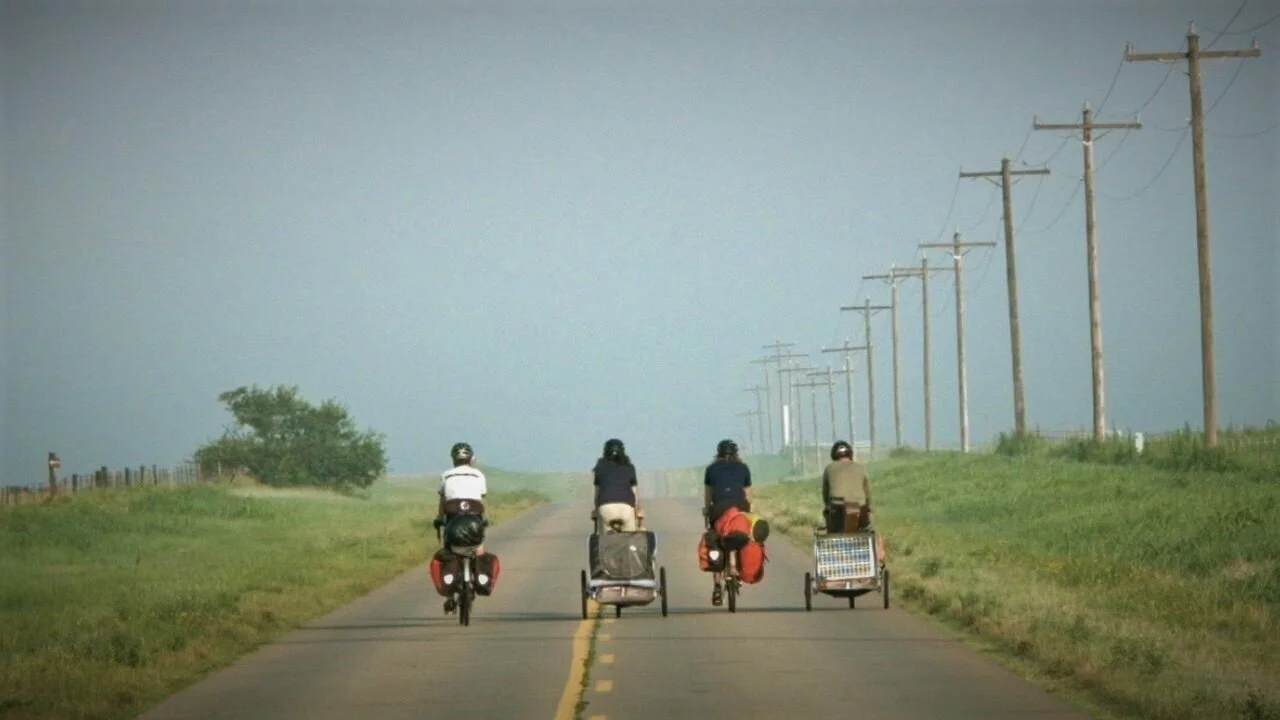The Bikes of Wrath
An unusual concept has given us a film that may well divide opinion.
John Steinbeck’s The Grapes of Wrath, published in 1939, is just as much a classic within American literature as is John Ford’s 1940 film version of it in the sphere of American cinema. No wonder then that this tale of the Joad family and their struggles during the Dust Bowl migration of the 1930s should continue to register around the world and with generations unborn when the work first emerged. That fact helps to explain why five relatively young men from Australia (the oldest of them are in their thirties) should have been inspired by the novel to set off on an adventure together in 2015. Their aim was to duplicate the journey depicted by Steinbeck travelling the 1547 miles from Sallisaw in Oklahoma to Bakersfield, California. They would take with them no more money than was on a par with what the Joad family had, but they would travel on bikes and en route would seek to assess to what extent the America of today still echoes the hard times of the era known to Steinbeck, not least in terms of its poverty and homelessness.
No less a part of the plan was to film a record of their journey since, out of the five, two (Cameron Ford and Charlie Turnbull) were ready to act as directors and a third (Redouane Chaouki) would be the chief photographer. If the idea sounds like the kind of project that youngsters might talk about but never actually do, it could be that this film will enable such youths to experience it by proxy as observers. Whether or not that lies at the root of its appeal for some, The Bikes of Wrath (that being what the bikers chose to call themselves although it makes for a rather off-putting film title) has won acclaim including the People’s Choice award at the Banff Mountain Film Festival.
However, despite the film seeking to be an invitation to the viewer to share the experience, I myself felt disengaged. Its most positive quality is the way in which it reveals the generous, friendly nature of so many ordinary folk encountered during the trip but, while several montage sequences offer the thoughts of these people on the state of their lives in 2015, nothing really unexpected or noteworthy is said and it also feels out of date already (the journey took place just before Trump emerged as President and made his mark on society). Hardly more telling are the frequent brief readings from the novel set up for the camera.
Worst of all, though, is the way that the film has been put together. Ford is credited as co-director and sole editor so must suffer the blame here. Distracting edits frequently appear within a single scene - often indeed in the middle of what one person is saying - and, although the film is presented chronologically, sudden inserts appear of comments made in the opening Australian locations but only incorporated late on. To my mind, The Bikes of Wrath illustrates all too well how not to edit a film, while the journey along famed Route 66 yields much less than I had expected. In contrast to my reaction, other viewers may take to the company of these travellers so strongly that spending time with them in this novel way may be a welcome experience.
MANSEL STIMPSON
Featuring Cameron Ford, Charlie Turnbull, Oliver Chiswell, Redouane Chaouki, Leon Morton.
Dir Cameron Ford and Charlie Turnbull, Pro Cameron Ford, Ph Redouane Chaouki, Ed Cameron Ford, Music Jamie Messenger.
Doss Flamingoss/Screen Australia/Film Victoria-Jonny Tull.
101 mins. Australia. 2019. Rel: 13 December 2019. No Cert.


